White House under fire for failing to submit Iran nuclear report
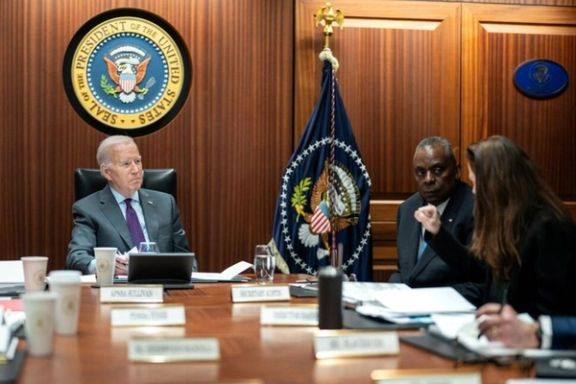
The Biden administration is under scrutiny for failing to submit a legally mandated report on Iran's nuclear program amid accusations of being too soft on Iran.

The Biden administration is under scrutiny for failing to submit a legally mandated report on Iran's nuclear program amid accusations of being too soft on Iran.
Senator Lindsey Graham (R-SC), who co-authored Public Law 117-263, Section 5593 of the Iran Nuclear Weapons Capability and Terrorism Monitoring Act of 2022, accused the administration of violating the law by missing crucial deadlines, according to the Wall Street Journal.
The law mandates a biannual assessment to Congress on Iran’s uranium enrichment and nuclear weapons development progress which led the United Nations' nuclear chief to admit recently that Iran is "weeks not months" away from a nuclear weapon.
In a letter to Avril Haines, the Director of National Intelligence, Senator Graham stated that the administration is "in violation of the law" for missing two Section 5593 assessment deadlines in the past year and failing to submit Section 7413 assessments when Iran reaches major enrichment thresholds.
The White House has long been under fire for taking too soft an approach to Iran as it appears reluctant to address Iran’s actions and avoid increased tension before the November election.
While the US has imposed sanctions against Iran, not only has Iran's nuclear program reached levels way beyond global regulations, but its ability to evade sanctions has seen its illicit oil sales spike since President Joe Biden took office, in turn funding its terror operations globally.
The White House has also been criticized for not adequately informing the public about Iran’s involvement in regional conflicts, including the war in Gaza, Houthi attacks on commercial shipping, and assaults on US bases in Iraq, Syria, and Jordan.

Iran's President-elect Masoud Pezeshkian will be officially inaugurated on Sunday, July 28, as the next president in a ceremony called Tanfiz, hosted by Supreme Leader Ali Khamenei.
Two days later, he will take the oath of office in the parliament, during a ceremony called Tahlif in the Constitution.
There are several steps until the president-elect can be called Iran’s President.
After the election, the Guardian Council should confirm the validity of the results, ensuring that the election process followed legal precepts. Then, it issues a certificate of appointment for the president-elect.
This document should be signed by the members of the Council and then sent to the Supreme Leader, who would announce the date for Tanfiz, when he officially endorses the election results and ratifies the new president. It is followed by Tahlif, or the swearing-in ceremony, which usually happens within a few days.
The president will then have 15 days to present his proposed ministers to the parliament for a vote of confidence, which is reportedly set to be held on September 5.
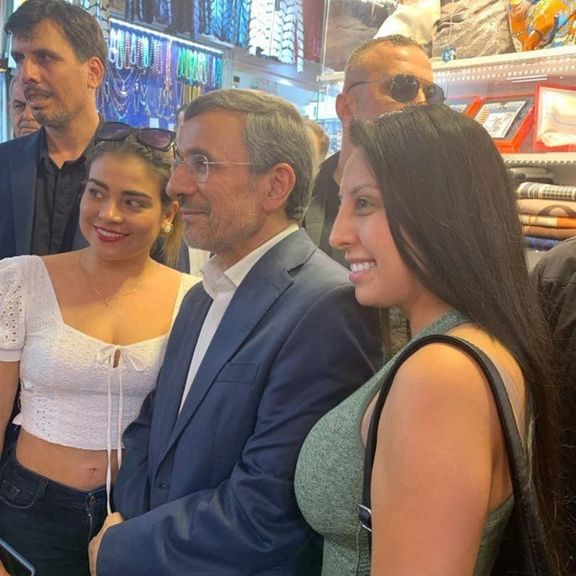
Mahmoud Ahmadinejad's recent trip to Turkey has sparked contrasting reactions, with Turkish and Iranian media offering divergent views on the controversial former Iranian president's visit.
Iranian media has focused its criticism on Ahmadinejad, particularly highlighting his photos with women not wearing hijab. One outlet, citing a state media host, wrote, “Mr. Ahmadinejad, we are not extremists, but can you justify such pictures with women dressed like this and without hijab?”
The news website went on to say, “When the former president of an Islamic country permits women dressed in such attire to take pictures with him, and these images go viral on social media, it can only suggest that he embraces liberalism and populism."
According to Dolat Bahar, a Telegram channel run by Ahmadinejad's supporters, his visit was purportedly in response to an official invitation from a technological university for a "four-day scientific and cultural visit."
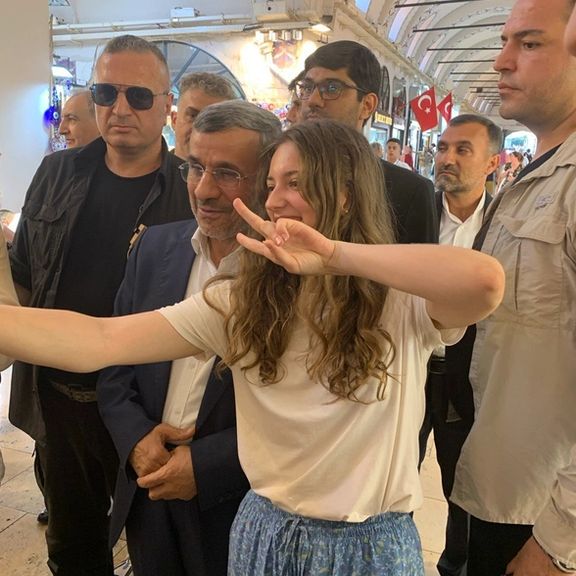
The channel posted numerous images of people taking photos with him on the streets of Turkey, including women without hijabs. Two of these pictures were featured in Iranian media, albeit with their bodies censored.
Mehrdad Farahmand, a Middle East analyst and political commentator based in Istanbul, told Iran International that many ordinary individuals in the Middle East, as opposed to the elite, particularly in Turkey, largely admire Ahmadinejad for his staunch opposition to the US and Israel.
Farahmand, a former BBC correspondent in the Middle East, said: “While the authorities in these countries typically refrain from advocating for cutting ties with the US and Israel, Ahmadinejad was notably vocal about these issues during his presidency.”
“His outspoken rhetoric and Iran's pursuit of nuclear capabilities were widely associated with his leadership. Ahmadinejad's rhetoric about eliminating Israel, despite being costly and widely opposed by the Iranian populace, nevertheless garnered substantial support from certain segments of the population [in the region],” he added.
Another focal point for Iranian media was the timing of his departure on the day of the runoff presidential election. They argued that there is no evidence that he voted, interpreting his departure and announcement on that day as evidence of a deliberate boycott.
“He did not participate in the first round of the elections, and in the second round, there is neither a record nor a report of his presence at the Iranian consulate in Istanbul to cast his vote,” news outlet Roudad24 wrote.
They also highlighted the politicians he met in Turkey, suggesting he associated with individuals of dubious reputation. Ahmadinejad met with Turkey’s former Interior Minister Abdülkadir Aksu and Mustafa Destici, the current leader of the Great Union Party.
This is while Farahmand described Aksu as a prominent figure within the Justice and Development Party, which has maintained its position as the ruling party since 2002.
Farahmand also characterized the Turkish media's coverage of Ahmadinejad's trip as positive, noting that his interview on TGRT Haber, a nationwide TV channel, was favorable and free from challenging questions.
During the interview, Ahmadinejad was questioned about the potential for a third world war. In response, he emphasized his stance as a proponent of peace, presenting himself as a seasoned politician dedicated to advocating for global harmony and conflict resolution.
Ahmadinejad, who has been barred from running in the past three presidential elections by the Guardian Council, controlled mainly by Supreme Leader Ali Khamenei, is believed to have registered for candidacy primarily to demonstrate his support base. Just before his most recent disqualification by the Guardian Council, he visited Tehran's Bazaar, where many supporters rallied around him. Following his initial disqualification, the former foreign policy hardliner began openly criticizing the political apparatus established by Ali Khamenei, even going so far as to challenge the Supreme Leader himself directly.
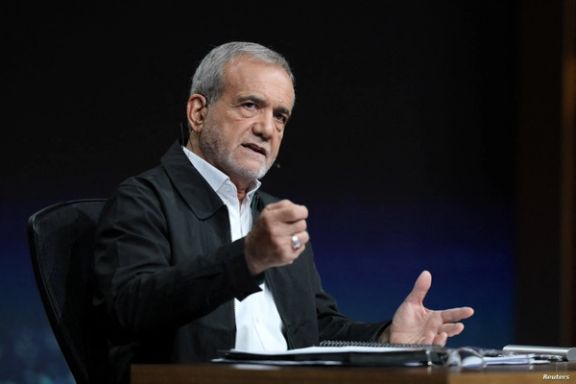
Iran’s newly elected president Masoud Pezeshkain began a regional charm offensive Wednesday, claiming in a piece written for an Arabic outlet that his government’s top priority is to expand relations with neighbors.
Bilateral relations between Iran and the Arab countries around the Persian Gulf has improved significantly since March 2023, when China brokered an agreement between Saudi Arabia and Iran, then led by former president Ebrahim Raisi who died in a helicopter crash in May.
“I extend the hand of friendship and brotherhood to all neighbors and countries in the region to launch a genuine and serious movement in the path of cooperation,” Pezeshkian said in a piece for the website New Arab. “Iran and its Arab and Muslim neighbors have common positions and interests… We all reject the monopoly of certain forces over world decisions, as well as the division of the world and polarization based on the interests of major powers.”
Iran and its Muslim neighbors do share a concern for Palestinians and their plight. But they have major differences in their approach to address that concern. Iran openly backs Hamas and many armed groups across the Middle East, some of which act against the interests of their government.
In April, when Iran launched a drone and missile attack on Israel, some Arab countries did join the United States to help fend off the attacks. Iran’s president-elect seems to have decided to ignore the differences in his piece.
“The bleeding wound of Palestine is our common cause, and its treatment is also our cause,” he stated. “Security and stability in the region will only be achieved by recognizing the Palestinian people's right to comprehensive resistance as a means to liberate them from occupation and secure their natural and obvious rights.”
Iran’s foreign policy is known to be determined by the Supreme Leader Ali Khamenei and his closest aides, most notably in the Revolutionary Guards (IRGC). Iran’s president has next to no say on strategic decisions beyond the country’s border, where IRGC’s overseas arm, the Quds Force, has for many years been the main player.
Unofficial reports Wednesday suggested that Abbas Araghchi, a central figure during the negotiations that led to the 2015 nuclear deal, would become the Foreign Minister. If appointed, Araghchi may once more play a key role in potential negotiations that Pezeshkain has vowed to pursue in an attempt to revive the nuclear deal.
Many of Iran’s neighbors are worried about the country’s nuclear program, which the UN nuclear watchdog says is one step away from weaponization. The US and other western governments are worried that Iran’s weaponization would lead other countries in the region to pursue a similar path. Once more, Iran’s newly elected seems to have overlooked this point in his piece.
“The Islamic Republic of Iran considers the strength of its neighbors as its own strength,” Pezeshkian said in his piece. “It believes that neighbors should not enhance their capabilities at the expense of others. The uber-priority of Iranian foreign policy is expanding cooperation with neighbors.”
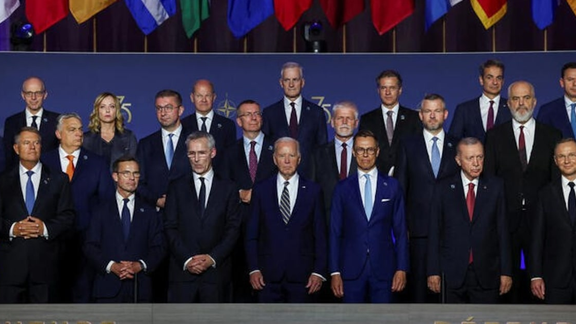
Leaders of the North Atlantic Treaty Organization (NATO) member states on Wednesday warned Iran against sending ballistic missiles to Russia, calling it a significant "escalation" in Tehran's support for the Russian aggression against Ukraine.
Iran and Russia have grown closer due to the war in Ukraine, which has resulted in sweeping sanctions on Russia from the US and the EU. Iran has supplied Russia with hundreds of kamikaze drones, and unofficial reports suggest that Tehran may be considering enhancing its assistance with missiles.
In a Declaration released on Wednesday, NATO leaders accused Iran of "fueling Russia’s war of aggression against Ukraine by providing direct military support to Russia, such as munitions and uncrewed aerial vehicles (UAVs), which seriously impacts Euro-Atlantic security and undermines the global non-proliferation regime."
The NATO leaders attending a summit in Washington DC warned that "any transfer of ballistic missiles and related technology by Iran to Russia would represent a substantial escalation."
In February, Reuters reported that Iran had provided Russia with “a large number of powerful surface-to-surface ballistic missiles”. The claim was later repeated by UK defense secretary Grant Shapps, who indicated that he had such information but refused to offer details.
Iran denied providing the weapons, and the US said it could not confirm the transfers, but it assumed Tehran intended to provide missiles to Moscow.
Recent satellite imagery published by Reuters showed major expansions at two key Iranian ballistic missile facilities that researchers assessed are for boosting missile production. Sources told Reuters the missile components would be sold to Russia.
The NATO leaders' warning comes less than a month after the Group of Seven leaders warned Iran not to give Russia ballistic missiles.
"We call on Iran to stop assisting Russia’s war in Ukraine and not to transfer ballistic missiles and related technology, as this would represent a substantive material escalation and a direct threat to European security," the G7 stated in mid-June.
Under severe international sanctions, Russia and Iran have expanded their economic ties, with mutual trade standing at $4 billion, which even Iranian officials admit is far below the target of $40 billion.
The two countries reached an agreement in December to eliminate the use of the US dollar in bilateral trade, a development heralded by Iran's central bank governor as a "new chapter." However, the move has more of a symbolic significance than a real economic act.
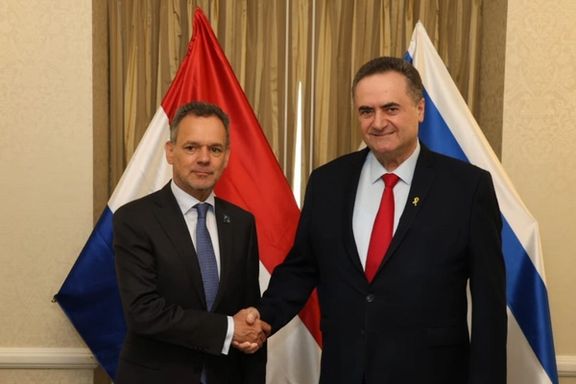
The Netherlands says it will support Germany's initiative that pushes for the European Union's listing of Iran's Islamic Revolutionary Guard Corps (IRGC) as a terrorist organization.
Last week, the European Union reportedly accepted a request from Germany to consider designating IRGC as a terrorist entity. However, Germany is not the only European country pushing for the listing of the Revolutionary Guard.
Dutch Foreign Minister Caspar Veldkamp announced on Wednesday that the Netherlands "will join the initiative to promote a decision in the EU to declare the IRGC a terrorist organization," Israeli Foreign Minister Israel Katz tweeted, after their meeting on the sidelines of the North Atlantic Treaty Organization (NATO) summit in Washington DC.
The two sides also discussed “the need to promote severe sanctions against Iran," Katz said. "We will continue to join hands in our fight against terror."
In late June, the German Press Agency (DPA) quoted diplomats as saying that “multiple EU countries including Germany are pushing to classify the IRGC as a terrorist organization on the basis of a German court ruling.”
The German legal ruling earlier this year is from the High Court in the city of Düsseldorf, stating that a 2022 attack on a synagogue in the city of Bochum was traced to the “Iranian state authorities.”